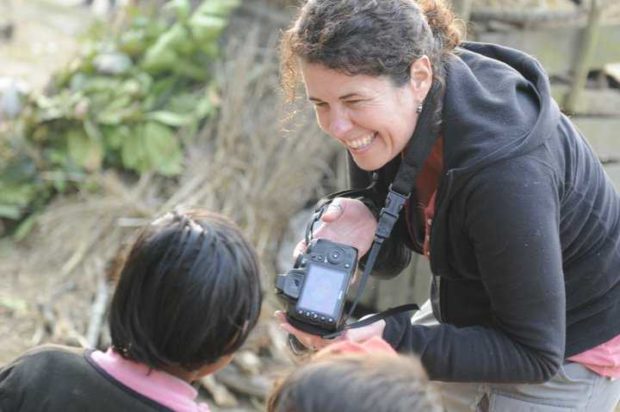
Sue Nichols reporting in Nepal.
By Kara Headley
While in Beijing working on a story about the new turfgrass for the 2008 Olympic soccer games, Sue Nichols needed a picture of the entire field. There was no easy way to get it.
“So I slung my camera over my shoulder and climbed up what must have been a four-story pole in 95 degree heat in Beijing,” Nichols said. “It was the only way I could get this picture that I really wanted of the whole field!”
Nichols, assistant director for Michigan State University’s Center for Systems Integration and Sustainability, recently became the first science communicator from Michigan to be named a fellow by the American Association for the Advancement of Science. The non-profit organization is dedicated to promoting cooperation in the scientific community. There were 416 members of AAAS named as fellows in 2018.
Nichols, a 1984 graduate of Michigan State University’s School of Journalism, makes the science research conducted at MSU’s Center for Systems Integration and Sustainability accessible to a global audience.
“I think that the process of science is fascinating,” she said.

Playing with pandas in China.
Much of her time is spent writing about the results from various studies by scientists for her center. She enjoys translating these findings into words non-scientists can understand so they too can see how science is changing.
After graduating from MSU with a bachelor’s degree in journalism, she worked for various news organization, including the Lansing State Journal where she was a crime reporter, and at USA Today. While studying at MSU, she wanted to work as a science writer, but the field was not as prevalent as it is today. Over time, she steadily shifted her focus from crime and other topics to science.
She worked as MSU’s chief science writer for 15 years before spending another two years at the University of Michigan as a science communicator. She has been with MSU’s Center for Systems Integration and Sustainability since 2010.
Making science accessible to non scientists is a key part of her work, she said.
“My job is to let people see if there is a place for them in [science] and to let them have access to it,” Nichols said. “That’s why I think it’s important. People should at least have the right to come in and take a look. The best way to do that is communicating it.”
In her 23 years as a science communicator at MSU, Nichols has contributed to communication about sustainability science. She has reported on subjects as diverse as pandas in China, tigers in Nepal and the environmental impacts of the soybean trade and of global fisheries.
She finds the fellowship humbling and a tremendous honor, and one that reflects well on her university.
“It shows that people have acknowledged that MSU has taken this seriously and has valued science so much that it supports the communication of it on many different platforms and in many different ways,” she said.
